Note for You, If You’re Having A Bad Day
Dear Friend,
Do you know your Enneatype? Someone once described the Enneagram to me as “Myers-Briggs Type Indicator, but for wise lesbians,” and that legitimized it for me — although, in fact, the Enneagram is ancient, and its similarities to MBTI begin and end with “they’re systems of personality typing.” The existing Enneagram literature spoke to me — particularly when it came to breaking down what different types could look like when the person wasn’t emotionally healthy. (I, like so many people, respond with more receptiveness to criticism than I do to praise. It is appropriate, therefore, that I write this newsletter.)
I am a Type Two: The Helper. I identify strongly with this type, although I’ve been told it’s cloyingly on-the-nose for a woman to be a two. When twos are at their best, they’re unselfish, humble, altruistic, and unconditionally loving. Who wouldn’t want to exist as a Healthy Two? But, like I said, I identified more with the average and unhealthy levels listed on The Enneagram website: average twos start people-pleasing, and grow overly friendly, giving more compliments than they can possibly mean. Then, they need to be needed; they meddle. They want to be depended on. They become martyrs. At the hard opposite end of the spectrum — the most unhealthy end — twos excuse and rationalize themselves by naming themselves as victims. They have chronic health problems as they fall apart rather than burden others.
I’m bringing this up because I want to talk about help. That simple four-letter word is a workhorse — what would we be without each other’s help, and without the life-defining purpose of helping each other? — but also, it’s heavy. It’s full of questions, contradictions, and puzzles, and I’m yet to meet a person who has all of this figured out.
Here’s a non-comprehensive list of questions that come up around the idea of helping:
Who deserves help?
What happens to someone’s opinion of you when you accept help?
What is a good enough reason to decline to help someone?
What types of help are OK to ask for, and when do these asks become too much?
If someone asks you for help, and you’re stretched too thin, what will someone think or feel if you say ‘no’?
Does helping need to be balanced?
Should you help people who aren’t asking for it?
How should you receive help?
I posted something on Instagram this week about saying “yes” when someone asks if there’s anything they can do to help. This post took off in a way that made me go, “Huh! I guess this is something we need to talk about!”
The book I’m working on now (about kinship structures) has a chapter about asking for, receiving, giving, and drawing boundaries around help. In the proposal, I wrote:
What if there was a world where you had a pile of dirty dishes in the sink, and it was causing you great distress, and your friend came over, to hang out, and rather than feeling ashamed about your dishes, you felt empowered to ask your friend, “Would you mind helping me with those dishes? You could dry them while I washed? They’re causing me a lot of distress.” And then imagine your friend said, “You know, I appreciate you asking, but I feel kind of freaked out by other people’s dishes, so I’m going to say no. Can we take a walk instead?” Then you could say, “Sure! But I’d love if it could be short, so I could have time to come home and do these dishes.” And your friend could say, “That makes sense. Sure!” And you were able to believe, in your heart of hearts, that your friend did not love you any less, and that your friendship had not been affected negatively by this interaction. You stated a need, your friend stated a boundary, maybe there was a little discomfort throughout, but everyone ended up OK in the end, and your friendship actually emerged stronger, because both you and your friend left the interaction able to trust that the other person was going to be truthful, even if the truth wasn’t comfortable.
In response to this concept, my wonderful editor wrote, “If we can get readers to this point we will have succeeded beyond anything we could hope for.” I think she wrote that because she knows how hard this will be. The social landscape of help is a minefield.
Part of the problem is that we’re raised to think that we should be able to do the complex ballet of helping and being helped without any written-down or talked-about choreography. There are scripts that lots of us grow up with instructing us about the rules of help; we observe them throughout our lives, even though they’re rarely explicitly stated.
Here are a few I’ve noticed:
“If I have to ask you to help, it’s not really helpful.” You should volunteer to help whenever you see another person working in your company. You don’t volunteer by offering, you volunteer by doing: start clearing the table, scrubbing dishes, putting away the silverware.
“When you offer to help me, I’m supposed to say no.” Someone asking what they can do to help isn’t a genuine offer; it’s a statement that they recognize that you’re going through something hard. Your job is to show that you’re stoic and strong; you can handle whatever it is on your own.
“If you ask me to do something, I can’t say no.” No one asks for help unless it’s an emergency, and therefore, you can’t refuse a request for help, no matter how much you have on your own plate.
“We have to give each other equal amounts of help — and really, I should be aiming to give you more than you give me.” If you help me with something, I can’t accept help again until I help you with something, or I compensate you. Helping is transactional.
These are the exact scripts that lead to some of the characteristics of the Unhealthy Enneagram Twos. By being a person who exclusively gives and never takes, you can end up believing that people only love you because they need you, and without social norms for getting your own needs met, you can devolve into a physically ill martyr-type.
Here’s a secret: these rules are old, and no one is walking around keeping score and making sure you follow them. You are allowed to come up with your own beliefs around help! But because the scripts are likely deeply carved into the sinews of your brain, you’ll probably need to talk to the people you love about them.
I was having this conversation with my girlfriend K in January this year. We griped that it’s especially difficult to state a boundary (to say no when someone asks for help), particularly when you are technically able to provide the help. K paused, like she was thinking about something, then turned to me and asked if I could come over tomorrow night. She knew I couldn’t: I’m a newish mom with a full time job and I need to schedule my nights leagues in advance. She wanted me to practice telling her no.
I couldn’t believe how hard it was, even though I knew this was just an exercise. After all K gives to me, couldn’t I come over to her house just this one time? I should be able to move my schedule around for her; how would she know that I loved her and prioritized her? The scripts were firing on all cylinders. My eventual “no” was shaky, like a wet baby deer attempting to stand.
But this was the point: we need to practice. You have to find the people you really trust and tell them that you want to change the way we talk about help. You sit down, you look at your people, and you say, “I’m getting radical about helping. Who’s with me?” It’s useful to talk with the people you love about the values you were raised with regarding helping: asking, offering, receiving. And then, talk about the values you want future generations to have. Consider what it would feel like if you truly felt like you could offload some of the weight of your life onto the people you loved. Consider what it would feel like if you were the person in the position to do the lightening.
I’ve heard from lots of people that the question, “What can I do to help?” doesn’t feel helpful. Is there an answer to that question that isn’t “Nothing”? Particularly when you’re at a low, stretched too thin, overburdened and under-rested — trying to come up with a way to appropriately delegate can feel like just one more thing you need to do. And then after it’s done, you’ll probably need to send a thank you card, or find a way to reciprocate. Easier to just say “nothing, thank you” and move on.
My suggestion is to make a list when you’re not at your lowest. What little tasks would be nice to pass along to someone else on any old day of the week? Here’s mine:
Sweeping, vacuuming
Watching my daughter for an hour or two
Wiping down the surfaces in my home
Taking the heavy things out of the boxes in my mudroom
Spending time with and tending to my chickens
Prepping lunch (I like a bowl of greens with a protein, some rice, and a dressing)
Putting mailing labels on things for me when people order stuff
Watering my plants
Cleaning out my car
Keep it somewhere obvious, and then when someone offers to help, say yes, and hand them the list, like it’s a menu. “Would you be able to do any of these things?” you can ask. And they can say, “Actually, no; I didn’t realize how slammed I was until right now.” And that can be OK. You can still know that you love each other, more each and every day.
Good luck out there, bravely facing all that breaks your heart.
Love,
Sophie
Where Does That Come From?
I wrote that The Enneagram was “ancient.” That’s actually in dispute, and I should admit here that The Enneagram is Wikipedia-branded “pseudoscience,” which makes sense, because there’s, like, a magical element to all of it that I don’t all the way understand. The reason I wrote about “ancient origins” is because there are some similar ideas in the work of a 4th-century Christian mystic named Evagrius Ponticus; echoes of his beliefs are in the current Enneagram iteration. A man named G. I. Gurdjeff originated the word “enneagram” in the early 20th century, and his concept was picked up by two other men, Oscar Ichazo in Bolivia and Claudio Naranjo in Chile. Naranjo’s teachings are the ones that the so-called “wise lesbians” are into these days, and they’ve actually been adapted for use in Christian spirituality. The Enneagram got big in the 1970s, and it has stayed relatively big since then. The types are subjective and can’t to be tested scientifically; talking about your Enneatype is a little like talking about your horoscope in this way. What matters to me is that the framework has been a helpful thought exercise as I work through my own emotional stuff. Take what works for you, leave the rest, as they say.
Housekeeping:
This topic is very much a part of the book I’m working on, and I’d love resources! Have you read anything helpful in this department? Do you have thoughts about experts I should try to talk to? Let me know!
My essay from last week was featured in
last week, and it made me feel sparkly and nice.Next week, I’m going to start a Music League for members of the paid tier of this newsletter. If that’s not enough reason for you, maybe a reason is that when you pay for this newsletter, it becomes possible for me to keep spending time making it. It’s a big deal for me! If you’re not subscribed to the free tier, that makes a really big difference, too. Take a moment and subscribe!
Loose Thoughts:
I think usually people feel in-the-middle about things, and also feel unique for feeling in-the-middle about them, because in-the-middle people aren’t loud on the internet. The eclipse is a good example: I talked to a lot of people who were like, “I don’t really care about the eclipse; it’s fine, but I don’t care that much. Isn’t that unusual?” And I think my thought is that it is not unusual, and how great!
I gave a talk to my friend Peggy’s scientific illustration class this week, and talked about how I like to listen to music that was written for plants. This started a good conversation about this type of music — what kind of plants? Is there music specifically for specific kinds of plants? And the answer is yes, but who knows if we get it right or not.
My big problem with buying salsa is a fear that it will immediately go bad, because I think that it does! I think it would be nice to have smaller things of salsa be more normalized.
The spring weather has me believing that we should be eating only peas and soft herbs. Who is with me?
A bunch of details about my toddler, who is 2 years and 5 months old now: Her hair is long and curly, and I’ve never cut it. She loves tiny toy animals. She likes to decide which animal will be friends with which other animal. She loves when something is lightly sped up, like “The Wheels on the Bus” at 2x the speed. She won’t eat anything but tofu, soy sauce, rice, seaweed, peanut butter, and that’s it. Not even fruits! Not even polenta! Although this morning I made her a pancake out of a smashed banana, oats, and an egg, and she ate that. She likes when something is called a “pancake.” She’s always been a sound, happy sleeper, but for the past four months, she’s been screaming about bedtime and waking up in the middle of the night. She didn’t even do that when she was a teeny tiny infant, and I find myself desperately googling about it in the middle of the night, unable to sleep after 90 straight minutes of rocking a scream-sobbing kid. A week ago, we gave her a night light and some books in her bed, and everything changed for the better. She can look at the books for literal hours and not get bored. I relate.
There’s a new joy that you only get to have when you’re older and it has to do with reconnecting. When you suddenly have a few hours to re-learn a person you loved ten years ago, but have been out of touch with, and the details start filling in about their life as you talk on the phone or the video app or at the coffee shop, little rose bushes bloom around the edges of your insides. You must have known those bushes were there, but they’d been blending in with the other foliage and then, aha! A magnificent explosion of flowers, brighter than they were when they were planted.

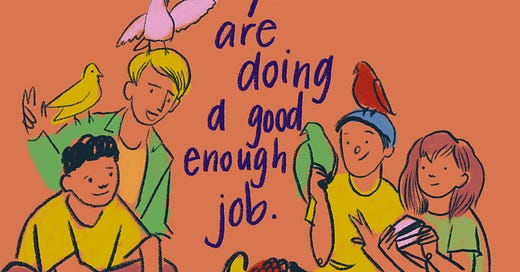



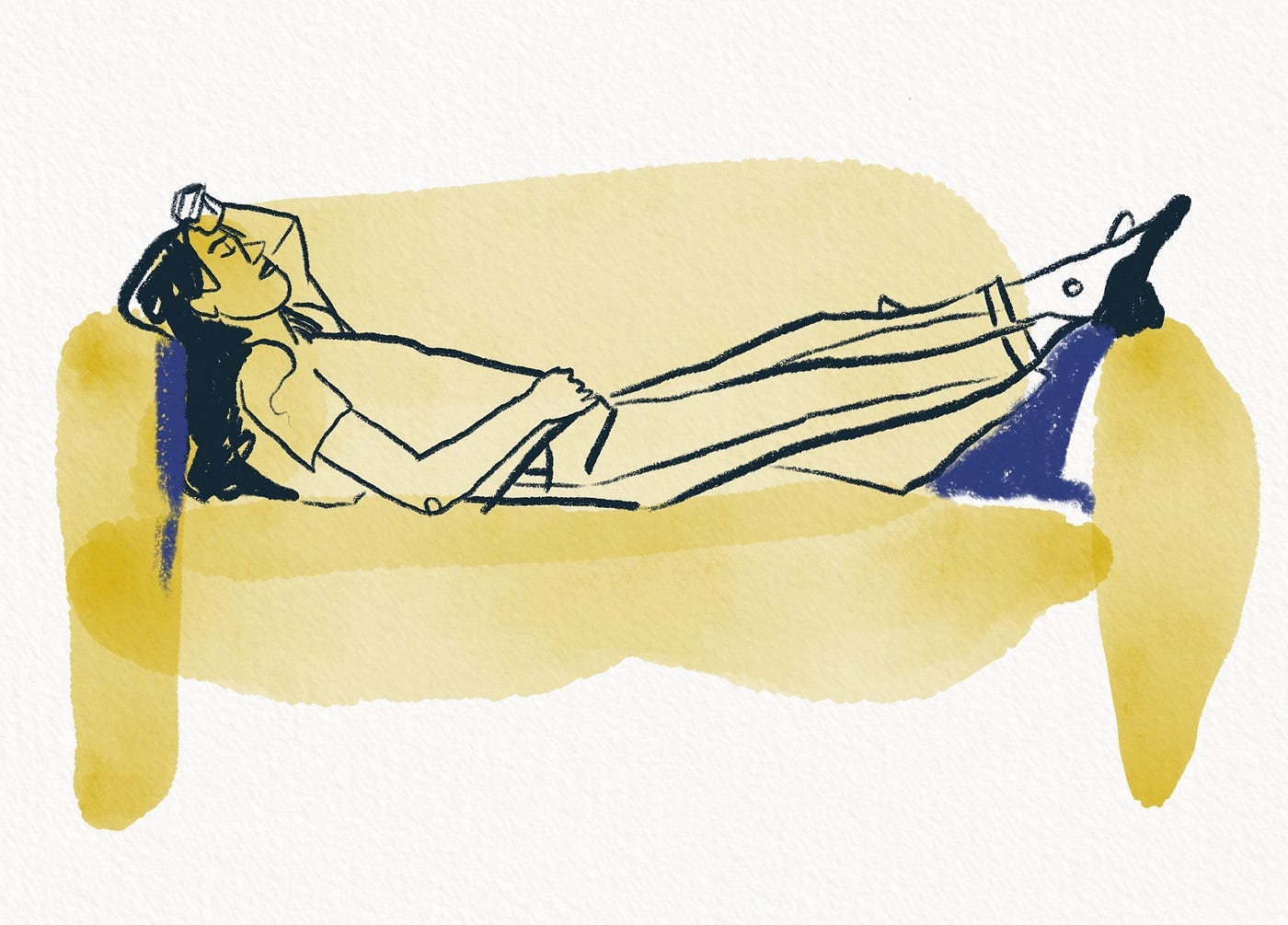

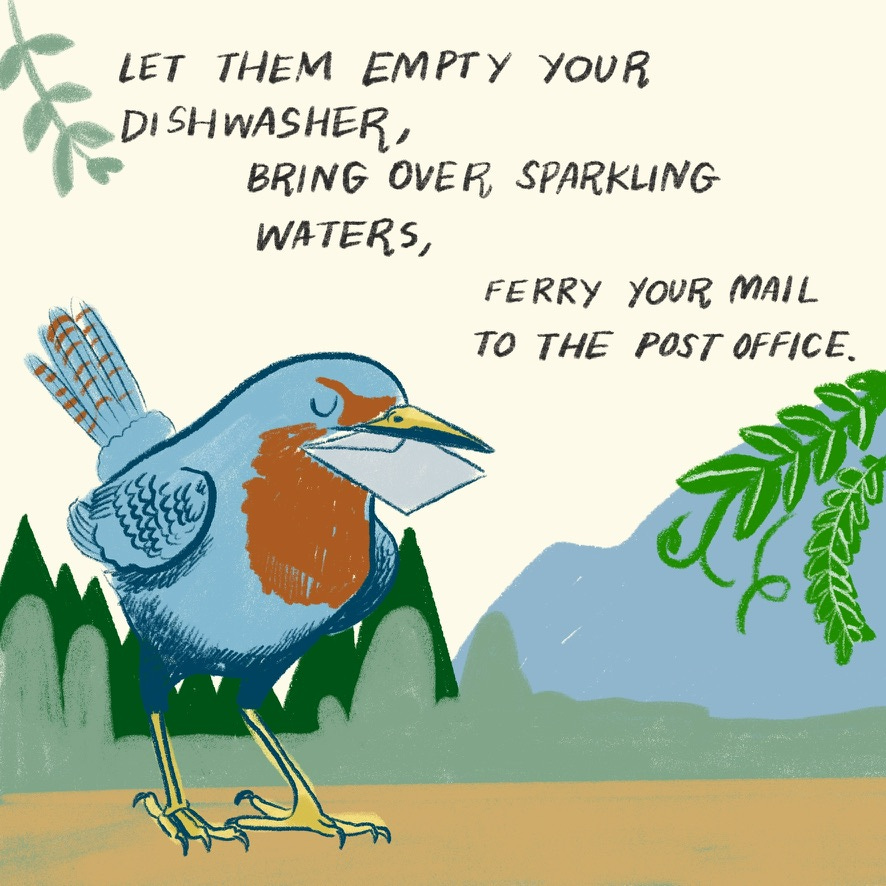
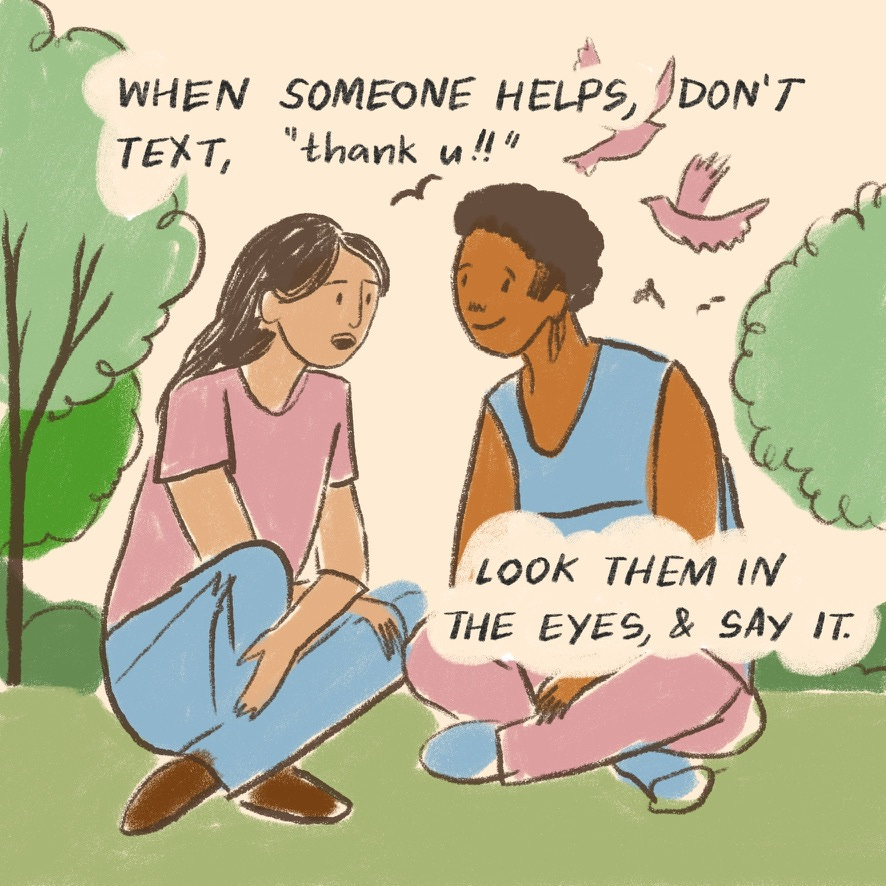
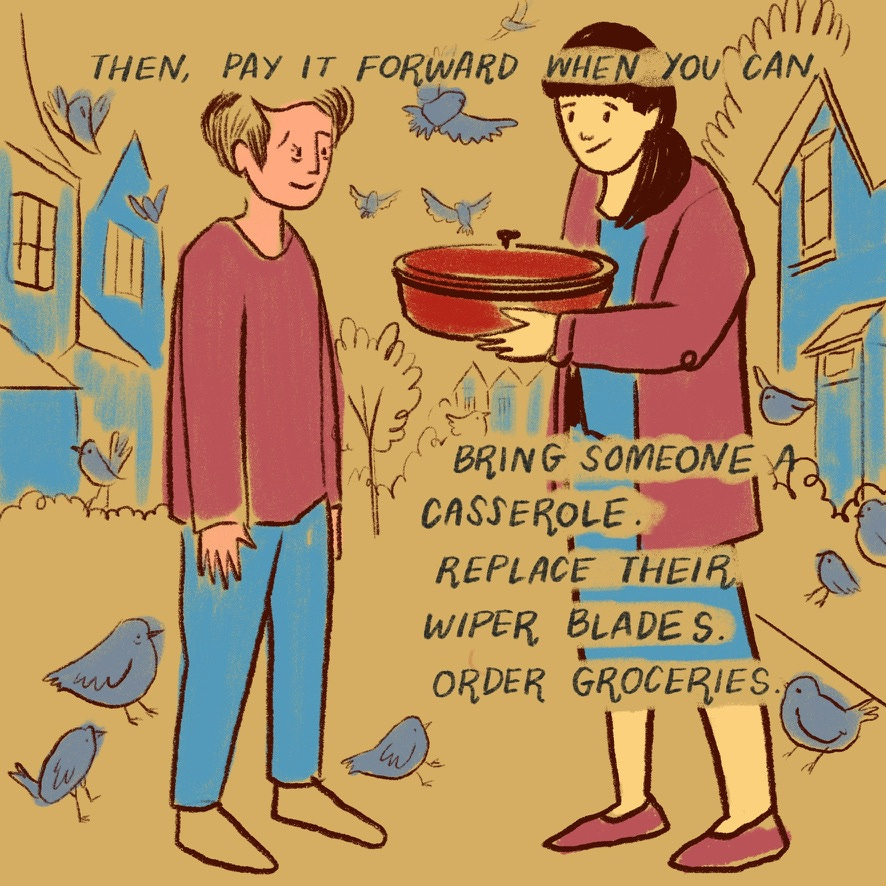
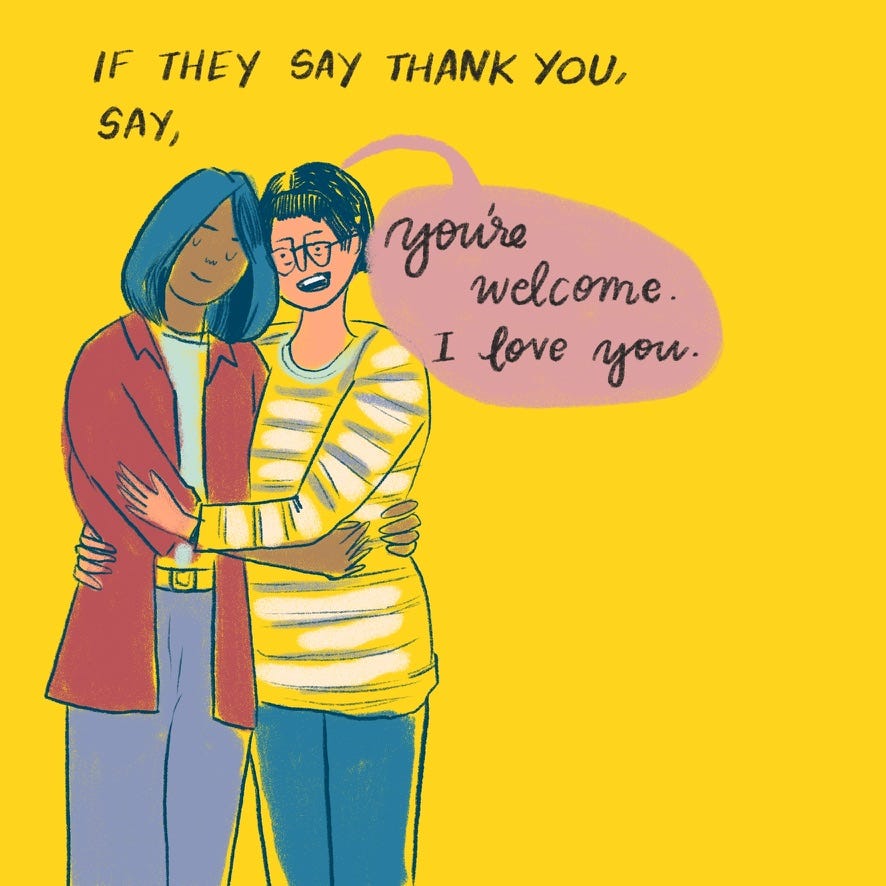


Wow, so much to love and relate to in this one. A few things:
1. I had a nice small world moment earlier this week with your instagram post about help that you wrote about here. A new friend I made recently (part of the ever-evolving polycule I monogamously orbit) posted basically every slide of that post to their instagram story, and I got to message them saying, "oh hi! that's my friend Sophie!" They recently started following you and love your work!
2. I listened to a podcast episode earlier this week that had some very useful things to say about how to help/support people experiencing grief. It was very timely because a friend of mine (also part of the polycule, lol) is having a heavy grief week - today is the anniversary of her dad's death. I cooked dinner for her last night, and I had all this fresh podcast advice about how so many people try to minimize other people's grief or rationalize it away, and really what people need is for someone to allow it and sit with them in it, to just let the grief be and accept it as it is, to ask questions and allow them to talk about the person they miss, etc. I cooked her dinner and refused to let her help and asked her a few gentle questions that allowed her to decide how much she wanted to talk about it. I think it all worked and I'm grateful both for the past grief that has allowed me to relate and to the podcast reminder of how to sit in the grief with someone. I thought I had no idea which podcast it was because I listened to a lot but I took a quick look at my app and figured out it was A Bit of Optimism (Simon Sinek's podcast).
3. I identify very strongly as an Enneagram 7. I mostly think that most of the personality tests and also horoscopes are mostly oversimplified or so vague that it is easy enough for people to see themselves in anything, but the Enneagram feels genuinely a lot more meaningful/useful. I once heard that you can tell which type is yours because it is the one that calls you out for everything that is wrong with you - you read through it with the horror of recognition, all of your flaws laid bare and not that unique after all if there are only 9 types. In any case, it really helped me understand some patterns in myself and figure out when they are helpful and when they are not.
4. Wow, that thing about people feeling unique/alone in feeling in-the-middle really hits home right now. I feel like everyone I know either has children or decided a long time ago that they didn't want them, and I am the only one grappling with my indecision/ambivalence, facing down 40 having never accepted the losses on either side by never choosing to walk through either door, wondering what would be different in my life if I accepted the losses and moved forward, grieving the life I'll never have. It's a very strange sort of grief because I'm well aware I would be happy with either choice - I'm grieving the fact that I can't live all the lives at once. But I remain in the middle when everyone around me appears resolved/certain and may misinterpret my grief as meaning I'm on the wrong side of the fence when I simply wish there were no fence.
Alright, that's enough... I'm deeply curious about everything you're working on for this book and need to scheme up a trip to Chicago to discuss further, enjoy the mutual joy of reconnecting, and do the NYT Sunday crossword.
This really resonated with me as another 2! Thank you for writing this!
My marriage ended a year ago and I suddenly had to lean into my community like never before. With my sister, her husband, and some of my friends, I have a Pact.
1) Say how you really feel, and trust that the other person will do the same.
2) Say it, even if it's hard.
3) Ask for help and trust the other person's answer, and know that any answer is okay.
It's still hard, but it's helpful when people invoke the Pact! ("I'm sorry for ask--" "Nope! Remember the Pact!")